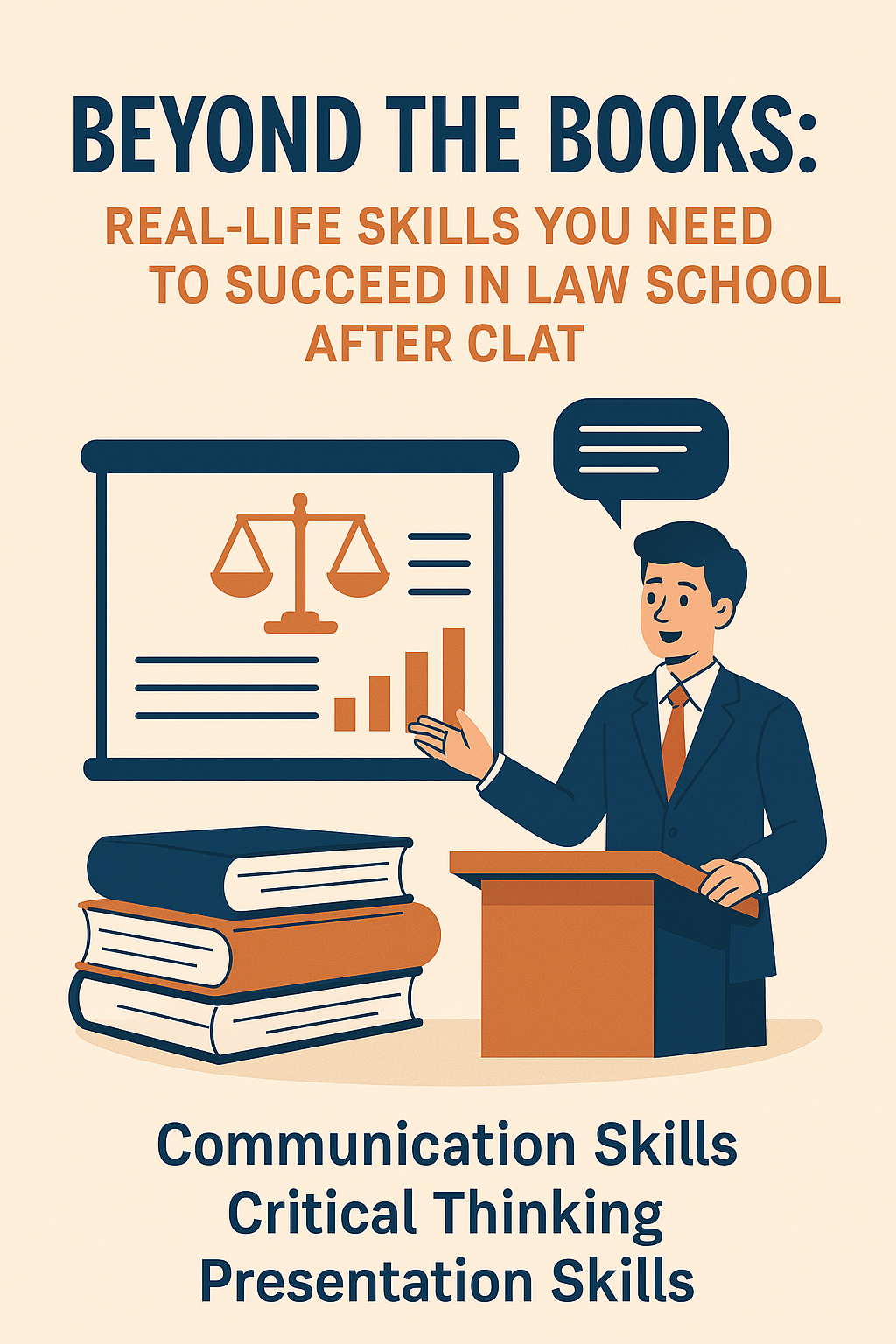Beyond the Books: Real-Life Skills You Need to Succeed in Law School After CLAT
Cracking the CLAT (Common Law Admission Test) is just the beginning of your legal journey. While aspirants often immerse themselves in books, coaching, and mock tests to secure a top law school seat, the reality of law school is much more than mastering textbooks. Once the entrance exam is cleared, and you step into the dynamic world of legal education, you’ll quickly realize that academic knowledge alone isn’t enough.
To truly thrive in law school—and later, in your legal career—you must develop a set of real-life skills that complement your theoretical understanding. These skills are essential not just for your grades but for your overall personal and professional development.
In this blog, we’ll explore three of the most crucial real-life skills that law students must develop after CLAT: communication skills, critical thinking, and presentation skills. We'll also touch on how these skills play out in real-world law school settings and how you can start honing them even before you step into campus life.
Join WhatsApp community for Free Notifications, Updates, Study Material, Mock Tests, Internship Updates, and Current Affairs - CLICK HERE TO JOIN
1. Communication Skills: The Heart of Legal Practice
In the legal world, communication is not just a skill—it’s a lifeline. Whether you're presenting an argument in moot court, writing a legal brief, or engaging in a classroom discussion, your ability to express yourself clearly and persuasively will determine your success.
a. Verbal Communication
Law school involves a lot of speaking: answering questions in class, engaging in debates, participating in group projects, and competing in moot courts. You must learn to articulate your thoughts confidently, listen actively, and respond constructively.
How to develop it:
- Join debate or MUN clubs in school or college.
- Practice extempore speaking in front of friends or a mirror.
- Watch courtroom dramas or legal speeches (like those by Fali Nariman, Harish Salve, or Indira Jaising) to observe how skilled lawyers frame arguments.
b. Written Communication
The legal profession requires a great deal of writing—memos, case briefs, research papers, and legal opinions. Legal writing is precise, concise, and analytical. Good grammar, vocabulary, and sentence construction are essential.
To Enroll in Knowledge Nation Law Centre - Click Here
How to develop it:
- Start maintaining a legal blog or journal.
- Take up online legal writing or creative writing courses.
- Practice writing short case summaries, opinions, or even article reviews regularly.
c. Interpersonal Communication
Law school is not a solitary journey. You’ll collaborate on research papers, group projects, or student-run legal aid clinics. Building strong interpersonal skills—like empathy, active listening, conflict resolution, and teamwork—helps you thrive socially and academically.
How to develop it:
- Take initiative in group discussions.
- Volunteer in social or community activities.
- Engage with people from diverse backgrounds to understand different perspectives.
2. Critical Thinking: Your Legal Mind's Sharpest Tool
Critical thinking is the backbone of legal reasoning. It’s the skill that allows lawyers and law students to analyze situations, identify problems, interpret laws, and craft innovative arguments.
Join WhatsApp community for Free Notifications, Updates, Study Material, Mock Tests, Internship Updates, and Current Affairs - CLICK HERE TO JOIN
a. Analytical Reasoning
Law school requires dissecting complex texts—statutes, judgments, contracts, etc.—and understanding what’s being implied between the lines. The ability to interpret legal provisions and identify key issues is vital.
How to develop it:
- Regularly read landmark judgments and try to break down the reasoning used by judges.
- Solve puzzles, riddles, and analytical reasoning sections from CLAT prep books not just for exams but as a habit.
- Discuss legal dilemmas with peers and analyze both sides of an argument.
b. Logical Argumentation
Whether you’re in a courtroom or a classroom, the ability to construct and defend a logical argument is essential. This skill involves identifying fallacies, using evidence, and presenting a coherent flow of ideas.
How to develop it:
- Take part in moot courts or mock trials, even informally.
- Follow real-life legal cases and try forming your own opinions about the verdict.
- Join online forums or groups where law-related debates are held.
c. Curiosity and Open-Mindedness
Critical thinking doesn’t mean skepticism alone. A good legal thinker is also curious, open to opposing views, and willing to adapt. Law is never black and white; shades of grey demand nuanced thinking.
How to develop it:
- Read newspapers like The Hindu, Live Law, or Bar and Bench to stay informed.
- Read diverse materials—history, philosophy, economics—to broaden your worldview.
- Engage with topics you disagree with, just to understand why someone might hold that view.
To Enroll in Knowledge Nation Law Centre - Click Here
3. Presentation Skills: Law is a Stage, and You're Always Performing
Whether you’re delivering a presentation in class, speaking in a moot court, or presenting a research paper at a conference, how you present yourself and your ideas often matters as much as the ideas themselves.
a. Public Speaking
Being a good public speaker is non-negotiable in law. From articulating arguments to pitching legal solutions, your delivery, tone, confidence, and body language create a lasting impression.
How to develop it:
- Join a Toastmasters Club or take up a public speaking course.
- Record yourself speaking and watch for clarity, pauses, and posture.
- Volunteer to present group projects or host events.
b. Visual and Digital Presentation
Modern law schools and firms often require digital presentations—using PowerPoint, Google Slides, Prezi, etc.—to explain legal cases or research. Making clean, clear, and engaging slides is a professional must-have.
How to develop it:
- Learn the basics of designing presentations with Canva or PowerPoint.
- Watch how TED Talks structure visual storytelling.
- Present a topic to friends using slides and ask for honest feedback.
c. Self-Presentation and Professionalism
First impressions matter, especially in law. How you dress, carry yourself, introduce yourself, and communicate with professors, seniors, and professionals reflects your commitment and credibility.
How to develop it:
- Practice professional email writing and formal conversation etiquette.
- Maintain a tidy, respectful appearance at interviews, events, or internships.
- Build your LinkedIn profile with achievements and interests to stand out digitally.
Bonus: Time Management and Self-Discipline
Though not the core focus of this article, it’s worth noting that law school is demanding. From juggling multiple assignments and internships to prepping for moots or exams, efficient time management is crucial.
How to develop it:
- Use planners or digital tools like Notion, Google Calendar, or Trello.
- Set realistic daily goals and evaluate your productivity each week.
- Learn to say no to distractions and prioritize what truly matters.
Join WhatsApp community for Free Notifications, Updates, Study Material, Mock Tests, Internship Updates, and Current Affairs - CLICK HERE TO JOIN
Why These Skills Matter More Than You Think
You might wonder—why should I worry about these things before even starting law school?
Here’s why:
- Law school moves fast. You won’t have time to develop these from scratch once you’re in.
- Internships and competitions begin in the first or second semester itself.
- Top recruiters and law firms look for more than academic scores—they want polished, articulate, and confident individuals.
The earlier you start working on these life skills, the more confident and prepared you’ll feel in every situation, be it moot courts, internships, or job interviews.
To Enroll in Knowledge Nation Law Centre - Click Here
Final Thoughts
CLAT might be the door that opens law school for you, but it’s your real-life skills that will take you forward from there. The ability to communicate, think critically, and present your ideas convincingly will set you apart from the crowd.
So, while you continue working hard for the CLAT exam, don’t forget to set aside some time each week to read aloud, write something, debate a topic, or prepare a short presentation. These small efforts will snowball into confidence and competence once you enter law school.
Remember, a great lawyer isn’t just someone who knows the law—it’s someone who can understand it, explain it, defend it, and live it.
Are you preparing for CLAT 2025?
Let us help you strengthen your communication and critical thinking with our expertly curated prep sessions and workshops. Drop us a message or explore our course offerings today!

 Info@Knowledgenation.co.in
Info@Knowledgenation.co.in











Leave a Comment